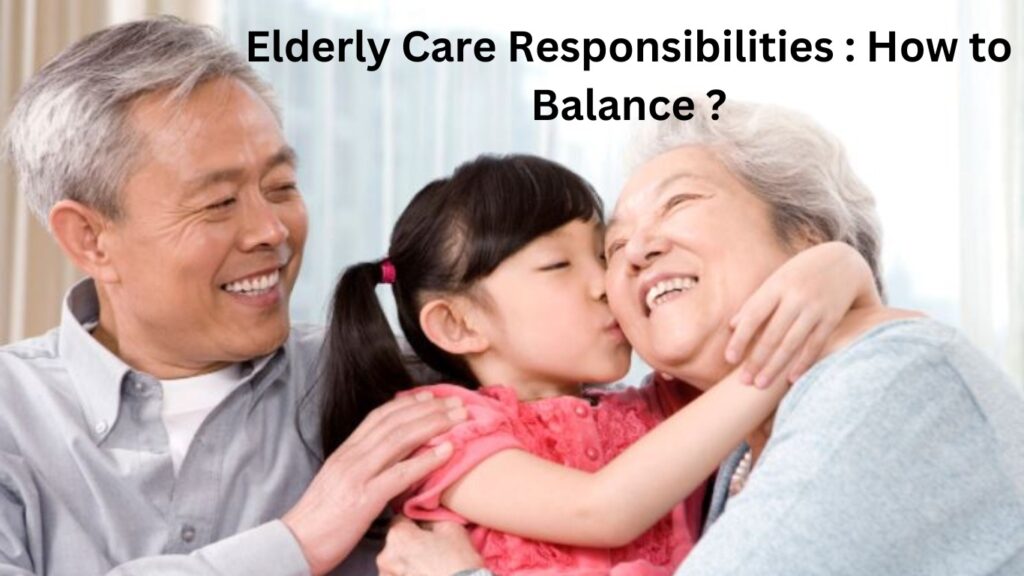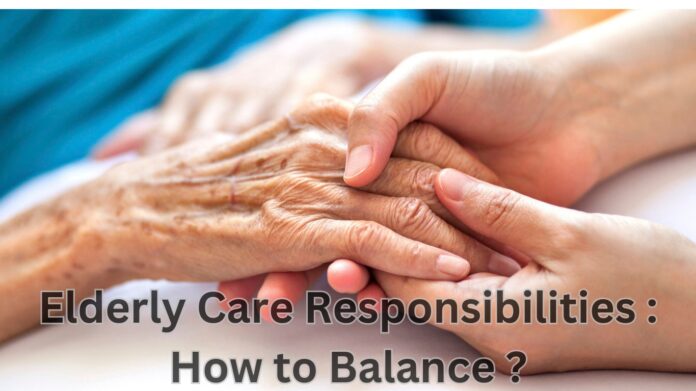Elderly care : As our loved ones age, their needs evolve, and it becomes increasingly important to ensure they feel valued, loved, and cared for. Taking care of elderly family members is not just a duty but a cherished opportunity to give back to those who have shaped our lives. Balancing this responsibility with our hectic schedules can be challenging, but with careful planning and a compassionate approach, we can make it work. Here’s a comprehensive guide on how to care for elderly family members, manage your time effectively, and ensure their happiness.

Understanding the Needs of the Elderly Care
Before diving into practical tips, it’s crucial to understand the common needs of elderly individuals:
Physical Care: This includes assistance with daily activities such as bathing, dressing, and mobility. Regular health check-ups and medication management are also vital.
Emotional Support: Many elderly people experience loneliness and depression. Emotional support through regular communication and companionship is essential.
Safety and Security: Ensure their living environment is safe to prevent falls and accidents. This might include installing grab bars, ensuring proper lighting, and removing tripping hazards.
Social Engagement: Encourage activities that promote social interaction, whether through family gatherings, community centers, or senior clubs.
Time Management Tips for Elderly Care
Balancing caregiving with work and personal responsibilities can be daunting. Here are some strategies to help manage your time effectively:
- Create a Schedule
Develop a weekly or monthly schedule that includes time for caregiving, work, personal activities, and rest. Prioritize tasks and allocate specific time slots for each activity. A well-organized schedule can reduce stress and ensure that you’re giving adequate time to each area of your life. - Delegate Responsibilities
Don’t hesitate to seek help from other family members or friends. Delegate tasks such as grocery shopping, meal preparation, or taking the elderly to medical appointments. This not only lightens your load but also fosters a sense of community and shared responsibility. - Utilize Professional Services
Consider hiring professional caregivers for certain tasks. Home health aides, nurses, and therapists can provide specialized care that you might not be equipped to handle. This can free up your time for other responsibilities while ensuring your loved one receives quality care. - Set Boundaries
It’s essential to set boundaries to prevent burnout. Communicate your limits to your family and seek their understanding and support. Make sure to carve out personal time for self-care and relaxation. - Use Technology
Leverage technology to streamline caregiving tasks. Apps and devices can help with medication reminders, health monitoring, and even virtual doctor visits. Technology can also facilitate communication with family members, making it easier to coordinate care.
Tips to Make Elderly Family Members Happy through Elderly Care
Happiness and well-being are just as important as physical health. Here are some tips to bring joy and fulfillment to your elderly loved ones:
- Engage in Meaningful Conversations
Spend time talking with your elderly family members includes elderly care . Listen to their stories, experiences, and wisdom. Meaningful conversations can alleviate feelings of loneliness and foster a deep emotional connection. - Encourage Hobbies and Interests
Support them in pursuing hobbies and interests they enjoy includes elderly care. Whether it’s gardening, painting, knitting, or reading, engaging in activities they love can bring immense joy and satisfaction. - Organize Family Gatherings
Regular family gatherings create a sense of belonging and happiness. Celebrate birthdays, anniversaries, and holidays together. Simple get-togethers can make them feel cherished and connected. - Promote Physical Activity
Encourage light physical activities suited to their abilities, such as walking, stretching, or yoga. Physical activity improves overall health, boosts mood, and can be a fun way to spend time together. - Provide a Safe and Comfortable Environment
Ensure their living space is comfortable, clean, and safe. Personalize their room with familiar items, photos, and decorations that bring comfort and happiness. - Involve Them in Daily Activities
Involve them in daily household activities as much as possible includes elderly care. Simple tasks like folding laundry, setting the table, or watering plants can provide a sense of purpose and keep them engaged. - Show Affection and Appreciation
Regularly express your love and appreciation. Small gestures like hugs, kind words, and thank you notes can make a big difference in their emotional well-being. - Access to Health Care
Ensure they have easy access to healthcare services. Regular check-ups, medications, and any required treatments should be managed effectively to keep them healthy and reduce stress. - Facilitate Social Connections
Help them stay in touch with friends and other family members. Arrange visits, make phone calls, or use video chats to maintain their social connections. - Consider Pet Therapy
If they love animals, consider pet therapy. Pets can provide companionship, reduce stress, and improve mood. Even regular visits from a friendly pet can have a positive impact includes elderly care.
Elderly Care : Caring for elderly family members is a profound act of love and respect. While it requires time, effort, and careful planning, the rewards are immeasurable. By understanding their needs, managing your time effectively, and incorporating activities that bring joy and fulfillment, you can ensure your elderly loved ones live their golden years with dignity and happiness. Remember, the small acts of kindness and love you show daily make all the difference in their lives.
What are the basic needs of elderly individuals?
Elderly individuals require physical care, emotional support, safety and security, and social engagement. Physical care includes assistance with daily activities and health management. Emotional support involves regular communication to alleviate loneliness. Ensuring a safe living environment prevents accidents, while social activities keep them engaged.
How can I balance work and elderly care responsibilities?
Balancing work and caregiving can be managed by creating a structured schedule, delegating tasks to family members or professional caregivers, setting personal boundaries to avoid burnout, and utilizing technology for efficient caregiving.
What are some tips for making elderly family members happy?
To ensure elderly family members are happy, engage in meaningful conversations, encourage their hobbies, organize family gatherings, promote physical activities, ensure a comfortable living environment, involve them in daily tasks, show affection, and help maintain their social connections.
How can I ensure the safety of an elderly person at home?
Ensure safety by installing grab bars, improving lighting, removing tripping hazards, using non-slip mats, and keeping emergency contact numbers accessible. These measures help prevent falls and create a secure living environment.
What professional services are available for elderly care?
Professional services include home health aides, nurses, therapists, social workers, and respite care providers. These professionals offer specialized care, medical assistance, therapy, emotional support, and temporary relief for family caregivers.
How can I encourage social engagement for my elderly loved one?
Encourage social engagement by arranging regular visits from family and friends, enrolling them in community activities or senior clubs, using video calls for distant relatives, and supporting participation in group activities.
What are some signs that an elderly person needs more care?
Signs that more care is needed include difficulty with daily activities, frequent falls, noticeable weight loss, memory loss, withdrawal from social activities, and poor personal hygiene. These indicators suggest a need for increased support.
How can technology help in elderly care?
Technology aids elderly care by providing medication reminders, health monitoring, virtual doctor visits, home security systems, and communication tools like video calls. These technologies enhance care efficiency and connectivity.
What should I consider when hiring a professional caregiver?
When hiring a caregiver, consider their qualifications, experience, background check, references, compatibility with your loved one, and cost. Ensuring these factors will help find a reliable and suitable caregiver.




